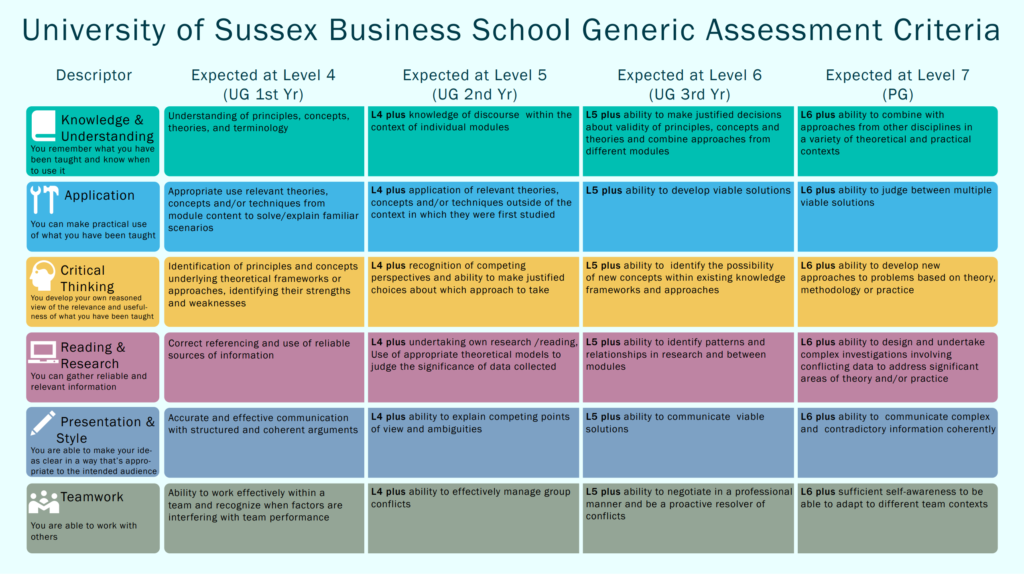
Ilina Stanimrova (BA Media and Communications) is a final year student who took part in the recent assessment criteria project at the Business School as a Student Connector. Here she explains how to understand the criteria and apply feedback to your work.
As students at the University of Sussex Business School, your academic journey will involve many exams, essays, reports and teamwork tasks. Your academic performance will be evaluated based on newly-redesigned generic assessment criteria and individual feedback. Therefore, it is important to understand the new assessment criteria and how to apply it to your work in order to achieve the best results.
Applying the criteria to your work
The Business School assessment criteria consists of six descriptors:
- knowledge and understanding,
- application,
- critical thinking,
- reading and research,
- presentation and style, and
- teamwork.
These descriptors are devised to indicate the strengths and weaknesses of your work. Every year of your degree, you are expected to enhance your skills within the descriptors and show improvement in your academic skills. The assessment you receive from the descriptor rubric will be your general feedback.
The assessment criteria is visible for all students throughout the year and it can be used as a tool to guide you towards academic success. You can ask your tutors and module convenors questions about the assessment criteria. You are also encouraged to consult with your Academic Success Advisor on ways you can use the assessment criteria to help your studies.
Applying feedback to your work
In addition to general feedback, you will also receive individual feedback on your work. This means that you should expect personalised comments which point out areas of strength and weakness. This individual feedback aims to help you understand your mark more clearly. Personalised comments should help motivate you to improve. You are encouraged to discuss your personal feedback with your tutor or Academic Success Advisor.
The benefits of clear assessment
The new assessment criteria is designed to be more transparent and accessible for students. The criteria was co-created by Business School faculty and Student Connectors with the aim of improving student academic experience and ensuring students have fulfilled their learning potential. Business School teaching staff want you to grow your knowledge and performance and hope that the revised assessment criteria will help you with your learning.
Lecturers and tutors are open to talk with you about your course, modules and assessment as they want to help you achieve the best results and gain knowledge in your field of study.
Student Connectors
Student Connectors helped collate an accessible assessment criteria written and explained in plain English and that students understand what is expected of them. The team hopes that you will appreciate and use the new assessment criteria to your advantage to improve your academic skills.
Read more about the role of Student Connectors and the background to the project


[…] University of Sussex Business School Assessment Criteria project was created in response to NSS results that indicated Business School student finalists’ […]